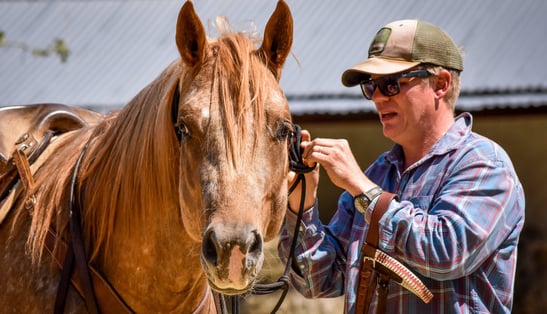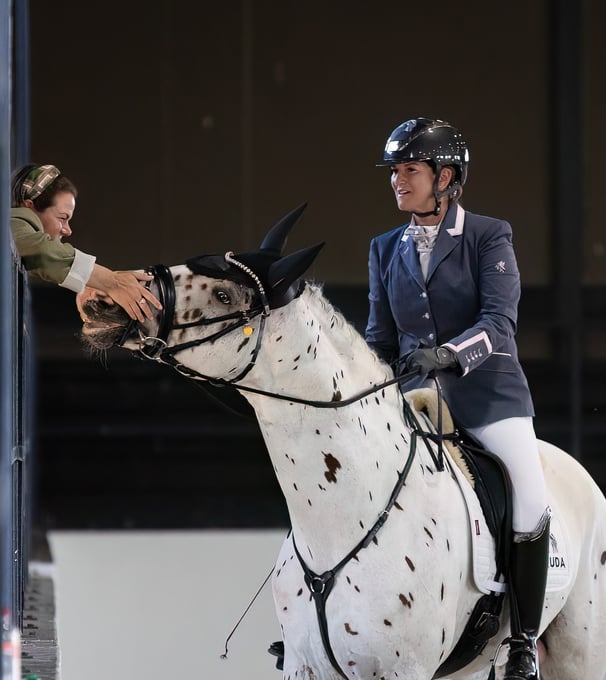What we do
A fundamental part of our values is our dedication to establishing essential foundations for our young stock. We believe that horses who understand their relationship with humans and understand our expectations set the stage for exciting future adventures in learning and building confidant, well rounded partners. Although the ongoing training and additional resources may add to the investment, there are countless reasons why a well-prepared and exposed horse is a worthwhile purchase. Our satisfied buyers frequently commend us on the exceptional disposition of our horses, validating our tried-and-true method of raising foals.


Through our training methods, we instil a positive work attitude in our young stock, significantly deepening the human- horse relationship
Our mare herd enjoys a natural lifestyle, staying out at pasture and coming in once or twice daily for concentrates and grooming. The mare barn primarily serves for show preparation, intensive care, or visiting mares. We practice rotational grazing as well as grow oathay for winter grazing and hay for baling. Our stallions only come in during the late afternoons and are quite content with this routine.
Approximately 90% of our breeding involves live cover, conducted in-hand. This approach allows us to maintain better control over the situation and keep more accurate records. Our mares generally foal outdoors, as nature intended, and we strive to intervene as little as possible. However, they are closely monitored both pre- and post-birth to ensure their well-being. This method allows us to respect the natural process and milestones, as well as to foster that essential bond between mare and foal.
It’s heartwarming to witness a guardian mare nearby, keeping other inquisitive mares at bay. The dynamics and relationships within the herd are complex and structured, and we aim to support this as much as possible.
Once the foal arrives and the mare has established the necessary bond, we focus on ensuring critical milestones are met.
Following this, we handle the foal daily, gently touching their tummy, legs, under the tail, and around the ears. Leading the dam and foal to the concentrates and back helps establish acceptance and communication. Foals understand pressure and release from the moment they're born, so we continue using a language they intuitively grasp right through to the ridden work.
Through our training methods, we instil a positive attitude to work in our young stock, deepening the human- horse relationship


As the foal becomes comfortable being contained and walks happily within the confines of a handler’s arms, we gradually introduce small tasks, such as putting the halter on and taking it off. Eventually, we hold the foal with one arm around its neck while gently touching the short leash attached to the halter. We avoid applying pressure to the halter, as the poll area is particularly delicate at this early age.
The process continues with exposure to grooming, monitoring temperature, and practicing proper leading techniques. Following this, we introduce TTouch bandages to help the foals develop spatial awareness and alleviate any feelings of claustrophobia. This training also prepares them for future experiences with blanketing and saddling.
We let the foals play with the lead rope in their mouths, which will help them acclimate to the concept of taking the bit and spitting it out comfortably someday. Once they are weaned, we introduce additional experiences such as bathing and time spent around and in the horsebox.
Every small step forward is positively reinforced, ensuring that these young horses build a solid foundation. This approach nurtures their curiosity and eagerness, setting the stage for exciting future adventures in learning. Younger horses excel when they are energised and enthusiastic, so a little goes a long way, every now and then, as they get time to process what they learnt. In the big pastures the young horses can play and roam in, teaching them essential social and survival skills within the herd.
During their time out, their physical endurance increases, and their musculoskeletal systems develop strength. We also provide them with the proper nutrition to help them reach their full genetic potential.
Our weanling and yearling herds has nannies who supports and guides them. This helps them learn healthy social boundaries and build confidence from the older horses.
Before the backing process starts most of our youngsters participate in breed shows for additional exposure and we have observed significant growth with each outing.
Overall, our efforts yield positive results, reflected in our enthusiastic, balanced youngsters.
Overall, our efforts yeald positive results, reflected in our well rounded and enthusiastic youngsters


Contact us
Ready to embark on your journey with an Appaloosa from Ruconu Appaloosa Stud? Contact us today to learn more about our services. We look forward to helping you find your perfect equine partner.

